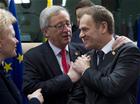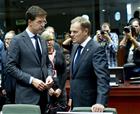Poland Is Facing A New Civilisational Jump
Adelina Marini, October 31, 2012
Poland is emerging ever more as an influential player on the European stage but this upsurge is directly related to the Polish economic miracle - the country has remained untouched by the eurozone crisis and is registering notable growth, while around it economy after economy are being brought down by recession, high unemployment, banking crisis or in general all the symptoms of the euro disease. In  2011 Poland's gross domestic product grew by 4.3%, driven mainly by investments and exports. The International Monetary Union forecast, however, is in 2012 the economy to slow down and growth to drop to around 2 and a half per cent because of weakening external and domestic demand. The main risk for the country stems from deepening of the eurozone crisis because over 75% of the direct foreign investments came from the zone of the euro. Separately, around 60% of the banking system in the country is owned by European banks.
2011 Poland's gross domestic product grew by 4.3%, driven mainly by investments and exports. The International Monetary Union forecast, however, is in 2012 the economy to slow down and growth to drop to around 2 and a half per cent because of weakening external and domestic demand. The main risk for the country stems from deepening of the eurozone crisis because over 75% of the direct foreign investments came from the zone of the euro. Separately, around 60% of the banking system in the country is owned by European banks.
 In a speech in the Polish Sejm (the parliament) on October 12th, Prime Minister Donald Tusk warned that 2013 is expected to be a difficult year when there will be much more questions than certainties for the economy. In his words, there are no reasons to believe that 2013 will be less difficult or calmer in a global or European aspect. "It will be a different year, but not necessarily a more difficult one for Poland", he said. A major priority of the second government of Mr Tusk will be to maintain economic growth at any cost. 2013 will be difficult also from the perspective of Poland maintaining the influence it has gained with stable politics and active diplomacy at EU level, guided mainly by defending EU integrity against the backdrop of the dangers from a division of Europe into several speeds and a eurozone core.
In a speech in the Polish Sejm (the parliament) on October 12th, Prime Minister Donald Tusk warned that 2013 is expected to be a difficult year when there will be much more questions than certainties for the economy. In his words, there are no reasons to believe that 2013 will be less difficult or calmer in a global or European aspect. "It will be a different year, but not necessarily a more difficult one for Poland", he said. A major priority of the second government of Mr Tusk will be to maintain economic growth at any cost. 2013 will be difficult also from the perspective of Poland maintaining the influence it has gained with stable politics and active diplomacy at EU level, guided mainly by defending EU integrity against the backdrop of the dangers from a division of Europe into several speeds and a eurozone core.
Poland is not a member of the single currency and has stated a number of times that for now it would not hurry to implement the criteria for membership. Nonetheless, however, Warsaw feels extremely committed to protecting the euro and is fighting for the right of non-euro countries to have a voice in discussing the architectural changes of the Economic and Monetary Union (EMU). But will the country be able to continue successfully the policy of benefiting from the two worlds - the non-euro and the eurozone? Poland has to decide as quickly as possible to join the eurozone, says Konstanty Gebert, head of the Warsaw office of the European Council on Foreign Relations, a European foreign policy think-tank. In an interview with euinside he explained that the more Poland dragged its feet deciding whether to accept the euro, the higher the price for membership will be. Unless this decision is taken in time, Poland  might end up in the European periphery, but that would be disastrous not only for the country but for the EU as well. Europe can hardly work without at least one major Eastern, Central European country in the core, Konstanty Gebert says.
might end up in the European periphery, but that would be disastrous not only for the country but for the EU as well. Europe can hardly work without at least one major Eastern, Central European country in the core, Konstanty Gebert says.
He said that the current influence of Poland in European politics is due to a lucky historical concurrence of circumstances which is a rarity in Polish history. A problem could emerge from the fact that political stability is still not a datum for the country and a possible change of the government could have a disastrous impact at a time when Poland would either way find it hard to defend what it has already gained, Konstanty Gebert believes. For now there is no solid political alternative to the coalition government led by Donald Tusk, but with the deterioration of the economic situation around Poland the challenges the country will be facing will only grow. This is why Warsaw is looking hard for coalitions of the willing through which to enhance its influence. Such a coalition is the Visegrad Four (V4) which, however, as much opportunities it offers that much risks it hides.
Konstanty Gebert explains that it is very difficult to find a common denominator between the four countries from the group - Slovakia, the Czech Republic, Hungary and Poland. One of the problems is that the rest of the countries in the group are reluctant to accept Poland as their leader. Besides, their economies and policies are heterogeneous. Slovakia, for instance, is a member of the eurozone and this is the first thing it takes into account when common initiatives are discussed within the V4. The Czech Republic, for its part is the Central European Britain which is against a further deepening of the European integration. And Hungary has issues with democracy and is showing signs of authoritarianism, aside from the financial crisis which it has been finding itself in for several years now. The countries from Central and Eastern Europe, however, have similar problems. In his speech at the annual meeting of the World Bank and the IMF in Tokyo, Marek Belka, Poland's central bank chief, said that growth after the 2008-2009 recession in Central and Eastern Europe has started to decline. The average annual GDP growth has dropped to 1.7% in the first semester of 2012, compared to 3.6% in the first half of 2011.
 This decline is due mainly to weakening of external demand but it also reflects deteriorating domestic conditions. For now Poland is the country that is managing the situation the best but this is not sufficient for the country to maintain its gains. This is why a major instrument of Poland's European politics is the fight for Budget 2014-2020 of the EU. If the economic clouds over Poland get thicker, however, the country will have to make a new civilisational choice, Konstanty Gebert warns - to sacrifice its ambitions to be a big European player, to settle in the periphery or to sacrifice its belief that it has made it (economically). And the problem with that choice is that there is no social enthusiasm. The entire interview with Mr Gebert you can watch in the video file.
This decline is due mainly to weakening of external demand but it also reflects deteriorating domestic conditions. For now Poland is the country that is managing the situation the best but this is not sufficient for the country to maintain its gains. This is why a major instrument of Poland's European politics is the fight for Budget 2014-2020 of the EU. If the economic clouds over Poland get thicker, however, the country will have to make a new civilisational choice, Konstanty Gebert warns - to sacrifice its ambitions to be a big European player, to settle in the periphery or to sacrifice its belief that it has made it (economically). And the problem with that choice is that there is no social enthusiasm. The entire interview with Mr Gebert you can watch in the video file.